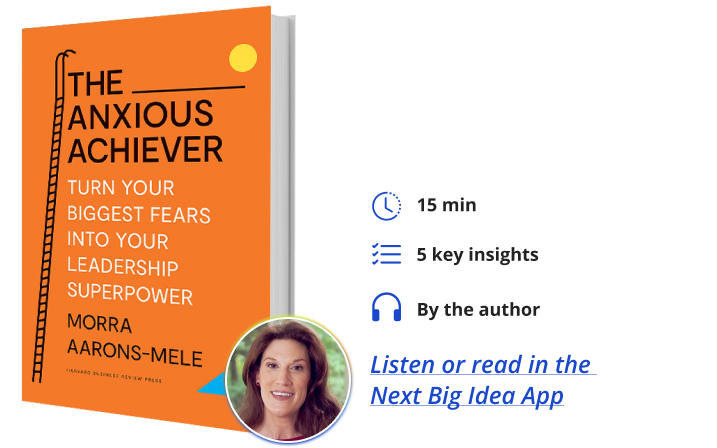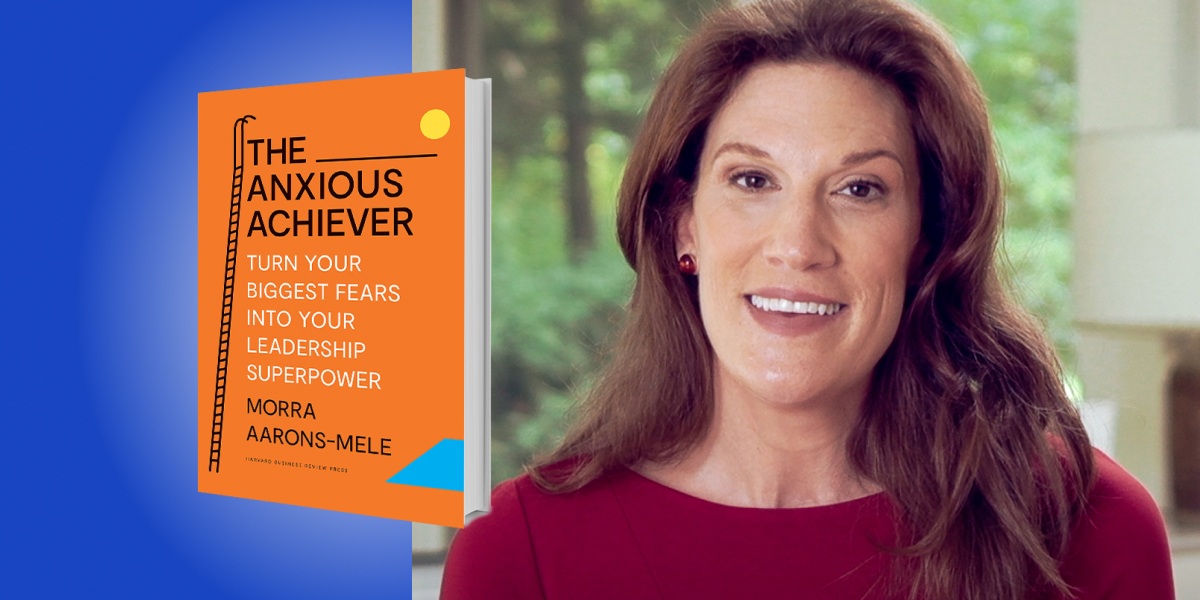Morra Aarons-Mele is a prolific writer and bestselling author of Hiding in the Bathroom: How To Get Out There (When You’d Rather Stay Home). She is the founder of an award-winning social impact agency called Women Online, as well as founder of the social change influencer database The Mission List. Her writing has been featured in The New York Times, NPR, The Wall Street Journal, and Harvard Business Review. She also hosts the podcast The Anxious Achiever.
Below, Morra shares 5 key insights from her new book, The Anxious Achiever: Turn Your Biggest Fears into Your Leadership Superpower. Listen to the audio version—read by Morra herself—in the Next Big Idea App.

1. When you understand your anxiety, you’re a better leader.
Do you ever find yourself struggling with worry and dread about everything that could go wrong? Are you a driven, perfectionistic overthinker who has a hard time letting things go? Do you sometimes feel that, at any moment, others will discover you don’t deserve to be in the room? Maybe you avoid certain situations, like flying or public speaking, even if it means sacrificing opportunities to advance your career? Or maybe you find yourself micromanaging and constantly checking in with team members, or redoing others’ work because it’s never quite up to your standards?
These are a few of the many ways that anxiety can show up at work and affect our well-being and effectiveness. But at the same time, you are ambitious, driven, and successful. I’d bet you sometimes rely on anxiety to grow in your career.
I wrote this book because my own anxiety propels me forward but it’s painful and sometimes all-consuming. I’ve devoted four years to researching and interviewing hundreds of leading experts to figure out how to build a career that isn’t ruled by anxiety.
Anxious achievers are goal-oriented, future-oriented, and prized team members because we go the extra mile, and nothing less will do. We create extraordinary outcomes because we are driven to excel and succeed at any challenge.
But we pay a price. Anxiety takes a toll on mental health, relationships, and joy. Anxiety is an emotion. It is not an uncontrollable external threat but an internal state you can manage. You can view anxiety as a loyal partner in leadership. Anxiety isn’t an excuse. It’s an opportunity to become strong.
When you understand your anxiety and learn how to leverage it, you develop a leadership superpower. Anxiety can enhance leadership, ambition, creativity, empathy, communication, and vision. When you’re attuned to your emotions, you become a self-aware, conscious, and thoughtful leader.
2. Ask: What is my anxiety trying to tell me?
What if instead of habitually acting out anxiety with a late night at work, endless scrolling on social media, or eating a Snickers bar, you took a moment to ask your anxiety, What are you trying to tell me? Why does this person’s name in my inbox make me feel dread? Why does that upcoming meeting make me want a shot of vodka? Reflection is where anxiety can be an ally. It can provide key information that’s not available any other way. You can see anxiety as existing on a spectrum of unmanageable, manageable, and helpful. But this might require discarding long-held beliefs of what strength, power, and success look like.
“We need to shift from mindlessly reacting to thoughtfully responding.”
Most of us act out our anxieties mindlessly, with reactions that don’t serve us or those around us. This isn’t anxiety’s fault. Anxiety itself is good data. It can push us to check in and change things, and it can even bring extra drive, energy, and focus. But we need to shift from mindlessly reacting to thoughtfully responding.
This is about taking power back from our automatic responses and learned behaviors, and then with full awareness, making the best decisions for ourselves and our organizations. The best leaders understand how anxiety drives their behavior and develop skills to manage their reactions while understanding what motivates their team’s actions.
3. It’s time to practice releasing control.
To an anxious leader, control feels so good. It’s such a human response. It’s our brain trying to protect us. As Dr. Christine Rynyan says, we humans evolved to stay alive. Those systems in our brains still exist. When we feel that things are uncertain and scary, all those chemicals and hormones kick in. We get anxious. So, along the way, we learn to cope with anxiety to feel better. Control is a coping mechanism a lot of us use when we get anxious. If we have the illusion that if we behave a certain way or think certain thoughts then we can keep control and bad things won’t happen, then our anxiety temporarily improves.
Three common ways we act out an anxious need for control are perfectionism, micromanaging, and overwork.
Perfectionism. Imagine if it vanished. Take perfect out of the picture and you’d still be a conscientious, hard-working, talented person, but without anxiety and its ripple effects.
Overwork. Jason Kander is a veteran of the war in Afghanistan and became a rising star in the Democratic Party. Because of his charisma, connections, and media appeal, politicians constantly asked him to host fundraisers and make introductions. He said yes to every request and flew all over the country delivering keynotes and raising money, even though behind the scenes he was suffering excruciating nightmares, terrible guilt, shame, panic, and anxiety.
It was only when he began entertaining thoughts of suicide that Jason sought help through weekly therapy. “That’s really where I learned that I had been using my professional life as an avoidance strategy for what was going on with me personally,” he says.
“If you want to manage anxiety for the long haul, you need to understand the origins of your drive to work too hard.”
Many anxious leaders rely on unhealthy reactions to soothe symptoms in the short term, but these ultimately become habits that increase stress, deplete energy, and undermine their leadership. If you want to manage anxiety for the long haul, you need to understand the origins of your drive to work too hard and examine if the plaudits are worth the price.
Micromanaging is one of the most common tactics anxious leaders rely on for control. Micromanaging can look like getting too involved in details, becoming overly involved in monitoring, and checking in on employees even if they’re doing perfectly fine with a task.
Anxious times at work may mean always preparing to face a threat, and so we persist in hyper-vigilance. This can annoy coworkers—not to mention make them anxious too.
Understanding the need to control is also super helpful if you have an anxious boss. How can you maintain boundaries while helping your manager feel calm? It’s all about communication.
4. We all have thought traps, and we can all get unstuck.
Ever walked into a room and thought, “I am a fraud. I do not deserve to be here”? You’re in a thought trap. You’re having impostor feelings. Thought traps can be called cognitive distortions or biased thinking. It is life-changing to understand your thought traps and lessen their teeth.
A thought trap is a negative piece of either self-talk, self-criticism, feedback, or an instant reflexive thought that happens when you’re anxious. For example, catastrophizing, jumping to conclusions, feeling like an imposter, feeling like you are not worth it, and “should” statements. It’s the negative, critical voice in your head. They’re so powerful because we do them by habit.
There are common ways thought traps catch us at work, but there are ways to break free. It takes practice, balanced thoughts, moving around, allowing others to help, and other simple, research-based actions.
5. You can learn to love your anxious self.
Harley Finkelstein, founder and president of Shopify, is an anxious achiever since childhood. He launched his first business at just 13 and kept going, especially when his family hit hard times.
“Well-managed, lower-level anxiety can be a tool and a powerful partner in your leadership journey.”
“That was not driven by passion,” Harley told me. “That was not driven by interests. That was not driven by some incredible ambition. That was driven by anxiety.” And for a while, anxiety negatively impacted Harley’s quality of life. He tried to get rid of it. He had to learn how to manage it and realized, This is part of me. But I can manage it better and make sure this superpower gets honed.
Some of us are just anxious. I have anxiety, depression, and a Bipolar II diagnosis. It’s a blessing and a curse, but like any challenge, it’s helped me become resilient, self-aware, and more compassionate.
You will occasionally hear people in this book refer to their anxiety as a superpower. I believe it can become a superpower if we do the work to make it so. Yet there is a tension here: Very few clinicians would call anxiety a superpower, and there is no doubt that anxiety can become disabling and render us unfunctional. Well-managed, lower-level anxiety can be a tool and a powerful partner in your leadership journey.
To listen to the audio version read by author Morra Aarons-Mele, download the Next Big Idea App today:































